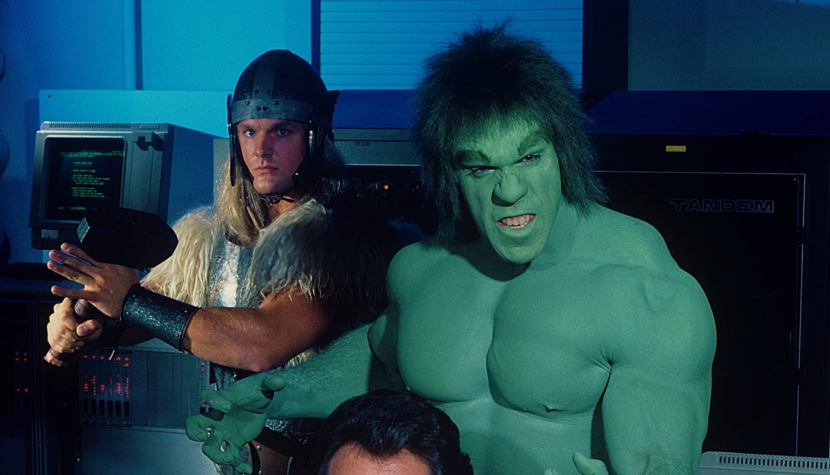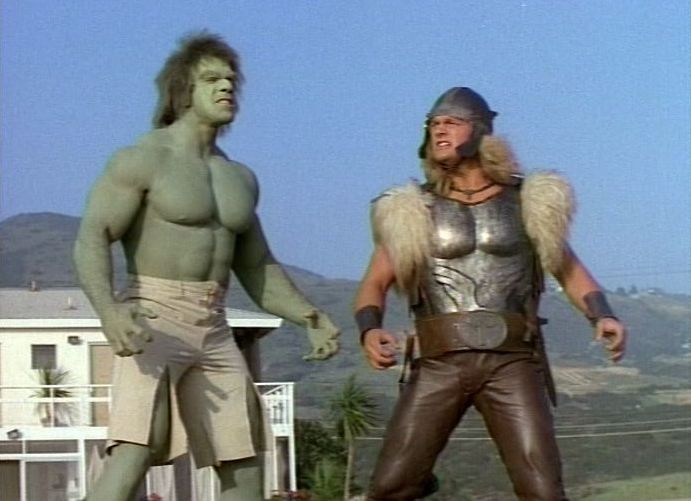THE RETURN OF THE INCREDIBLE HULK. The First Clash with Thor and a Unique Marvel Endeavor

“The Incredible Hulk Returns” (1988) was, in many ways, a unique project for Marvel. It was the first full-length film starring the Green Monster, though it also served as a direct continuation of the surprisingly popular five-season TV series. It also marked the first live-action appearance of Thor, the God of Thunder, leading to the first on-screen clash between two comic book titans. Given the epic showdown we’ve seen in “Thor: Ragnarok”, it’s worth looking back at the past—a very crude and tacky past.
The late ’70s were a strange time for comic book superheroes. Their adventures were considered too expensive and too silly to be adapted into live-action films or series. The brief success followed by the rapid decline in interest in Nicholas Hammond’s “Spider-Man” further discouraged producers. Still, CBS decided to take a risk, looking to veteran soap opera actors for help. David Banner (his name was changed from Bruce, apparently because “Bruce” didn’t sound masculine enough, though I’d argue the opposite—think Bruce Lee, Bruce Willis, Bruce Wayne) was played by Bill Bixby, known from “The Courtship of Eddie’s Father”, while his alter ego was portrayed by debuting bodybuilder Lou Ferrigno, simply painted green. The popularity of the series likely stemmed from its soap opera-like structure, which attracted not just a niche group of what we would now call nerds, but also audiences who enjoyed over-the-top intrigues, much like the ones in “Dallas” at the time.

The plot is simple, as long as you don’t try to compare it to Marvel canon. In the comics, Donald Blake is just an amnesiac Thor, but in the film, he is a separate character who controls the God of Thunder with the help of a randomly found hammer (never called Mjolnir in the movie). Is he worthy? It doesn’t matter—director and screenwriter Nicholas Corea erased that ancient rule. Dr. Blake meets Dr. Banner, and the two quickly show off their testosterone-fueled strengths, leading to a bare-bones, low-budget brawl. The budget didn’t allow for much beyond a hand-to-hand fight in goofy costumes. Eric Allan, who plays Thor and is mostly remembered as Little John from “Robin Hood: Men in Tights”, is the standout of “The Incredible Hulk Returns”, largely due to the exaggerated performance. Producers knew they couldn’t squeeze much more out of the green-skinned monster, so they used its lingering fame to attempt to lay the groundwork for a new series starring Thor. In the end, that never materialized.
Low-budget films from the ’80s often become caricatures of themselves over time. What once was intended as the height of drama is now a source of humor. This is why no modern tribute to that era can have the same impact. Those films didn’t parody themselves, they weren’t intentionally exaggerated, and the cast tackled even the most absurd parts of the script with deadly seriousness. “The Incredible Hulk Returns” is a textbook example—Donald Blake rummaging in Thor’s tomb looks like an amateur theater actor fumbling on a cardboard stage; the heroes’ first battle resembles a warm-up for a wrestling match; and when Thor hits the town for a beer and a dance with random women, it’s easy to forget what movie you’re even watching. The lack of action might be unbearable for today’s viewers, but it’s worth spending an hour and a half to see what, nearly three decades ago, was considered a flagship Marvel-inspired production. It doesn’t matter that Hulk and Thor couldn’t manage to ground a helicopter together, while Captain America now does it effortlessly on his own. In exchange, they’re given more personality than any character in “Age of Ultron”.

“He’s a friend from work,” Chris Hemsworth beams when Hulk charges into the arena in “Thor: Ragnarok”. The green muscle man is more than just a friend—he gave the Thunder God his first gig in the movie world. And while there’s no doubt that their recent encounter is better in every way, it’s worth taking a trip down memory lane to realize that Jared Leto as the Joker isn’t the worst casting in comic book adaptation history, and “Batman v Superman” isn’t that far off from its source material.

